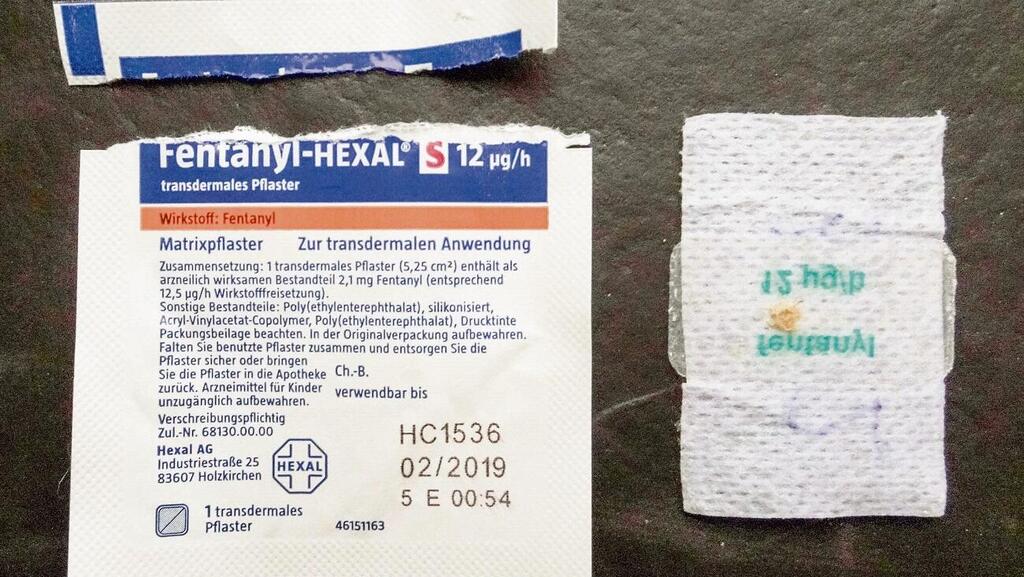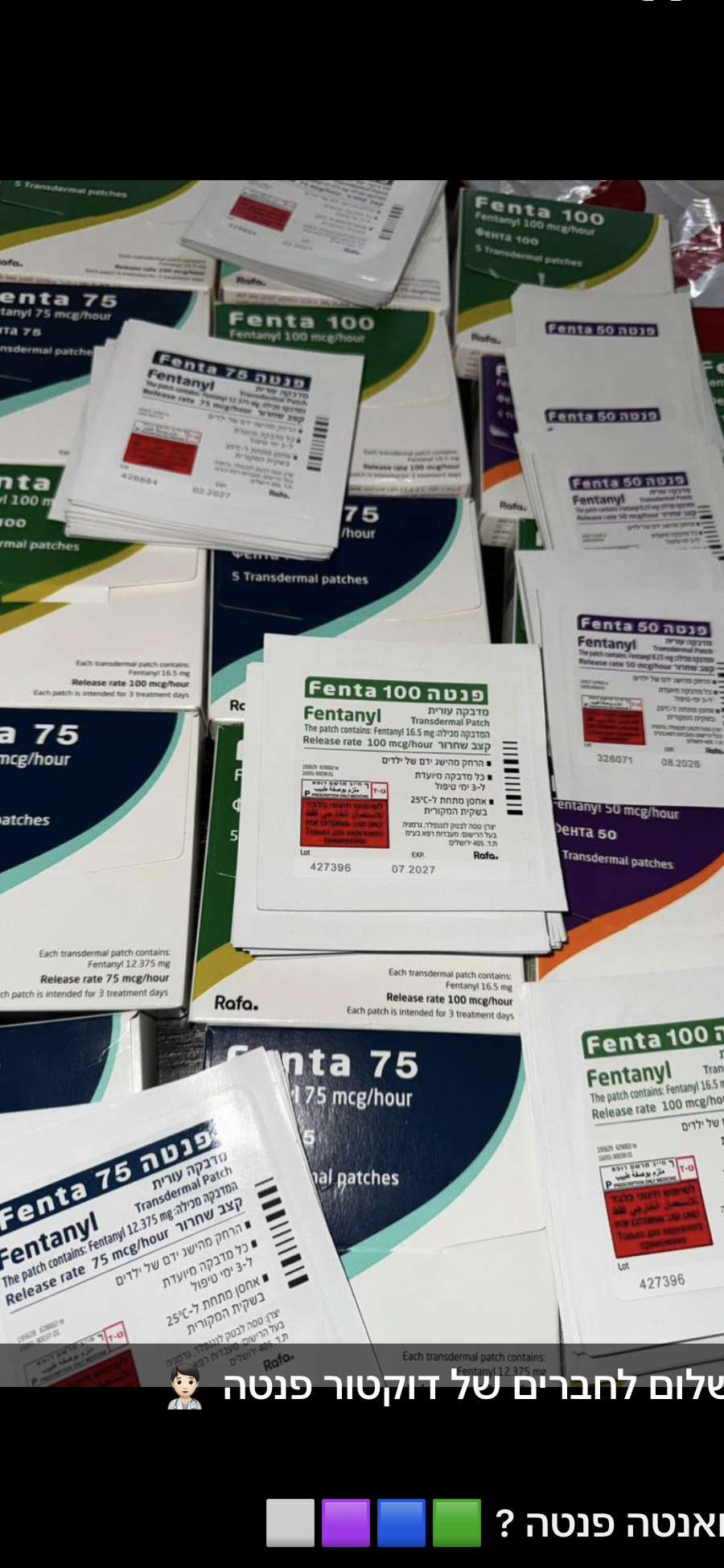Getting your Trinity Audio player ready...
If you search Telegram for the words fentanyl, Percocet or OxyContin—powerful opioid painkillers—you will find numerous channels and groups dedicated to selling them. These highly addictive prescription drugs can be extremely dangerous.
Nevertheless, an investigation by Shomrim reveals that access to them has extended beyond pharmacies and into the hands of drug dealers operating online, fueling a thriving black market. Drugs can be delivered by courier to your door.
Fentanyl, known colloquially as "Fenta," is a synthetic opioid 100 times more potent than morphine because it can penetrate the central nervous system and bind effectively to pain receptors. It is typically prescribed to cancer patients or people suffering from chronic pain that other medications cannot alleviate. The patch is applied to the skin for 72 hours, delivering rapid and potent effects. It is currently the most powerful pain medication available.
In some respects, fentanyl and other opioids have replaced heroin as the dominant street drug in the United States, contributing to an epidemic that has reportedly caused nearly 850,000 deaths. Using a fentanyl patch is alarmingly simple: rather than applying it to the skin, users place it on aluminum foil, heat it and inhale the vapors. The resulting high is significantly stronger than that of any other drug. However, fentanyl is also extremely lethal. According to U.S. health authorities, approximately 100,000 people still die from fentanyl overdoses annually, making it the leading cause of drug-related deaths.
While the extent of fentanyl use in Israel remains unclear, browsing Telegram reveals a vast inventory of potent prescription painkillers available through unregulated dealers. The sheer variety and price range suggest a highly competitive market. In addition to opioids, there is a wide array of psychoactive substances for sale, including benzodiazepines (anti-anxiety medications), sleeping pills and drugs for treating attention disorders.
Adverts in Telegram groups promote these substances with enticing offers. One post reads: "Dr. has lost it, and you win: Fenta 100 mg patches, including delivery, only 280 NIS." Another states: "Mr. Fenta is back and bigger than ever! Our courier is in the field, and the boss has gone crazy. We have all types of patches—100, 75, 50, 25 mg. Best prices on the market. Fast delivery in central Israel. Cash only. Gifts for new customers and those ordering three or more patches."
Accompanying images of prescription drugs often include brief descriptions of their intended use, active ingredients and mechanism of action. For example, beneath a picture of Attent bottles, a post explains: "Intended for treating ADHD and narcolepsy. Works by stimulating the central nervous system and increasing dopamine levels in the brain, enhancing focus and reducing impulsivity." Similar descriptions appear for drugs such as Vyvanse, Resilin, Oxycodone, Rivotril, Subutex, Zoldorm, Stilnox and Bondormin.
When Shomrim contacted a dealer to inquire about purchasing medications, we received the following response: "I have Ritalin 10 mg. 400 NIS, including delivery. Send me your ID verification: ID card, Facebook profile and a video with today's date and time, and we'll proceed." Other dealers required only a selfie with an identification document, ostensibly to verify that the request was not part of a police sting. It remains unclear how these verification processes work, but what is certain is that dealers are amassing a significant database of personal information.
The flood of prescription drugs into the black market can largely be attributed to fraudulent or misused prescriptions, often issued by doctors under duress. "We've lost control of the situation," said Dr. Roni Berkowitz, head of enforcement at the Israeli Ministry of Health, during a Knesset Health Committee discussion in February 2023.
"Over the past six years, opioid prescriptions have increased by 1.5 times, without a corresponding rise in the number of patients. We've heard of doctors being threatened and forced to issue prescriptions. The market is flooded with forged prescriptions in staggering quantities."
A closer look at the source of these prescriptions, points to a specific area: East Jerusalem. Health fund officials repeatedly cite East Jerusalem as a hub for excessive opioid prescriptions. "We see many young people, aged 18–20, receiving massive amounts of opioids for years. It’s clear they’re not using them personally—these quantities could kill an elephant. This is clearly for resale," said a senior official at Clalit, Israel’s largest health fund. According to data, around 4,000 Clalit patients in Jerusalem were receiving high-dose, long-term opioid prescriptions, with East Jerusalem residents disproportionately represented.
Why is the health fund not providing prescriptions to patients?
"It began during the second Intifada when health funds had difficulty reaching all East Jerusalem neighborhoods. Then they began using subcontractors and, in the process, avoided the need to monitor what was being done. Some of the clinics were operated by subcontractors who were doctors who no longer practiced medicine and had become businessmen. There’s one clinic operated by a truck driver," the senior doctor revealed.
What does this mean?
"Some clinics are financially incentivized to issue prescriptions liberally. A health fund pays a contractor 70–80 NIS per insured person per month, while the government pays the fund 4,000 NIS per insured person per year. The contractor then cuts costs wherever possible—hiring unlicensed doctors from the West Bank, for example, because they are cheaper than Israeli-licensed physicians. Some 'doctors' are recent graduates who haven’t even passed licensing exams."
Get the Ynetnews app on your smartphone: Google Play: https://bit.ly/4eJ37pE | Apple App Store: https://bit.ly/3ZL7iNv
How does it work?
"Unauthorized individuals issue prescriptions. A licensed Israeli doctor provides login credentials, and multiple unlicensed individuals use the same account to write prescriptions."
And the doctor is aware?
"Yes. He is being paid. In practice, he is selling the use of his license."
Does the Health Ministry know?
"I personally reported this to the ministry, but it seems they don’t want to deal with it for now.
So how does that come into play with prescriptions?
"If someone walks in and demands a prescription, I can’t refuse. I work in a dangerous environment, and there’s no police presence to protect me."
Doctors want to avoid trouble
A large subcontractor who lives and works in East Jerusalem describes a similar reality. "I can't pick up the phone to the police. I would be marked as a collaborator. This must be handled internally but the addict does not care, and doctors are frightened and give out prescriptions.
As far as you know, are the prescriptions used for pain relief or to sell drugs?
"There are cases when a patient is given the prescription because he needs it, but no one tells him it is dangerous. He then finds himself in a loop and relys on narcotics more and more until he is a junkie. Then he would be willing to sell his own mother, or wife, or everything he owns to get the drug.
"The others who get the prescriptions are dealers who buy the drugs and sell them. If you walk into the Shu'afat neighborhood, the cost of Percocet is NIS 500. As a patient of a health fund, you can buy it for NIS 17, so it is a good business.
The Health Ministry established a task force to deal with opioid addictions in recent years. Its main advantage is that it created a national database that revealed that in 2023, some 90,000 Israelis were prescribed opioids. The ministry saw a 5% drop in prescriptions for those drugs compared to previous years.
Officials in the ministry said the drop was a result of limitations put on health funds and more effective messaging to doctors. "If you complain to your doctor of back pain, he will not be able to prescribe Fentanyl. His computer would issue the prescription. The same applies to other opioids and extending prescriptions requires special authorization. As a result, we see that in some areas there is a reduction of prescriptions," Prof. Matan Cohen at the Clalit health fund, who had studied deaths from opioids in Israel, said, adding that considerable work has been done in East Jerusalem as well.
"Research done around the world shows that opioid use is more prevalent among low-income populations. This is a worldwide phenomenon which explains the increased use in East Jerusalem. The initiative in Clalit is a positive one. long-term prescriptions for thousands of patients are now being reviewed or have been stopped. The dosages are also being reduced," he said.
"The biggest problem is the drugs that come from private pharmacies, a Health Ministry Official said, adding that there is legislation underway that would limit handwritten prescriptions and the digital connection between private pharmacies and the health funds. This, he said, would reduce further the misuse of prescriptions and allow better oversight by the health funds.
The intersection of inadequate regulation, criminal influence, and a thriving online marketplace has turned prescription opioids into a lucrative business in Israel—one that endangers countless lives.




